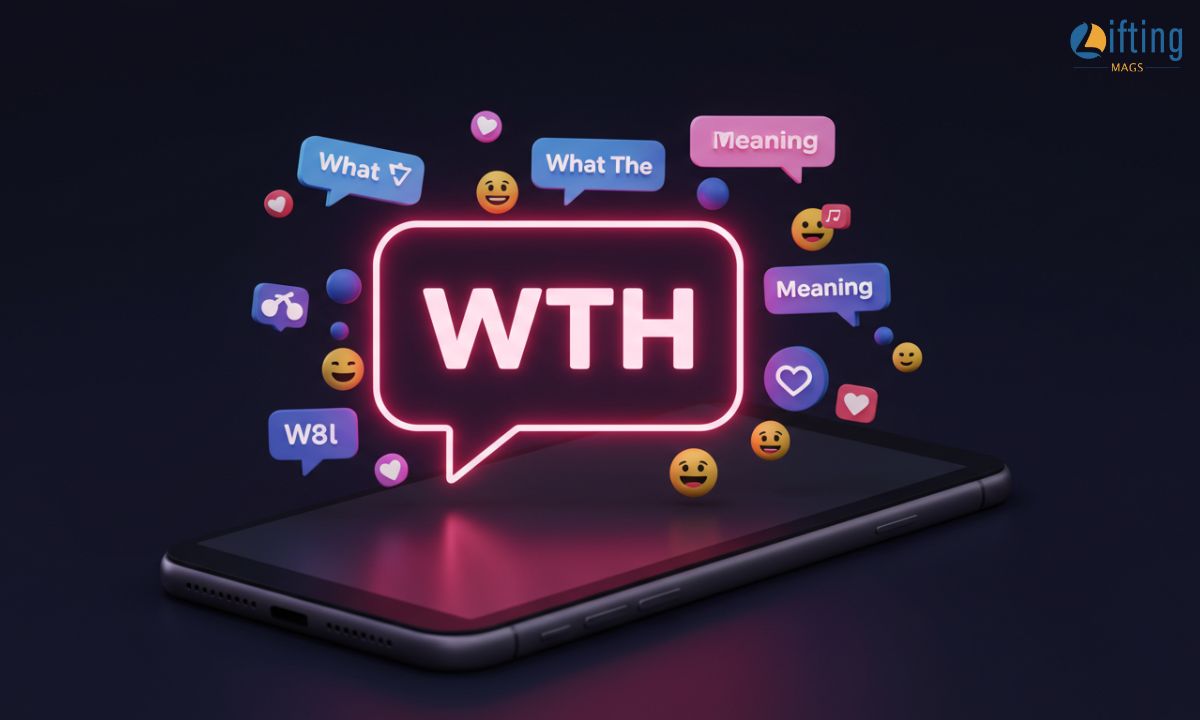Ever stumbled across “WTH” in a text or social media post and wondered what it means? This snappy abbreviation, short for “What The Heck” or “What The Hell,” is a go-to for expressing shock, confusion, or playful frustration. Whether in group chats, gaming streams, or casual workplace discussions, WTH is everywhere. Understanding its meaning and context can help you navigate modern conversations more effectively.
In this comprehensive guide, we’ll unpack the meaning, history, and usage of WTH across various contexts, explore common misconceptions, provide alternative phrases, and offer tips for responding appropriately. Let’s dive in!
1. Definition & Meaning
What is WTH?
WTH stands for “What The Heck” or “What The Hell.” It’s a digital shorthand that provides a quick and expressive way to react to unexpected or confusing situations. The phrase encapsulates a range of emotions, from surprise to mild annoyance.
Variations in Tone
- What The Heck: This version is more family-friendly and generally conveys a lighter tone. It’s often used in less formal contexts.
- What The Hell: This variant carries a slightly bolder edge and can express stronger emotions, though it remains relatively tame compared to harsher slang.
Example Sentences:
- “WTH, my coffee order came with decaf!” (surprise)
- “WTH, the printer’s jammed again?” (frustration)
2. Background & History
Origins of WTH
WTH emerged in the late 1990s, coinciding with the rise of internet chatrooms and texting. As digital communication exploded, users sought quick ways to express their emotions. Phrases like “What the heck?”—already popular in U.S. slang—were shortened to WTH, particularly on platforms like AOL Instant Messenger.
Evolution Over Time
- Early 2000s: WTH gained traction on teen forums like MySpace, often mixed with emoticons to enhance expression.
- 2010s: The character limit on Twitter (originally 140 characters) contributed to WTH’s popularity, as it fit perfectly within succinct posts.
- Viral Moments: In 2015, a viral Vine video featuring a dog “driving” a car sparked countless WTH? captions, cementing its place in meme culture.
Data Insights
According to a study by the Pew Research Center, 88% of teens use or understand online slang, with terms like WTH becoming integral to their digital communication. This statistic underscores the shifting landscape of language in the digital age.
3. Usage in Various Contexts
WTH adapts to many settings, each with a unique flavor. Here’s how it’s commonly used:
Texting
- Example: “WTH, my flight’s delayed by 3 hours!”
- Usage: Often used among friends to express empathy or surprise about personal news.
Social Media
- Example: “WTH, this AI art looks real!”
- Usage: Common in comments and posts on platforms like X and TikTok, sparking engagement and reactions.
Gaming
- Example: “WTH, I lagged out in the final round!”
- Usage: Frequently used in esports or casual gaming streams, particularly during dramatic moments.
Casual Workplace Chats
- Example: “WTH, the coffee machine’s broken again.”
- Usage: Suitable for informal team chats but not recommended for formal communications.
4. Common Misconceptions & Clarifications
Myth vs. Reality
Myth 1: WTH only means “What The Hell.”
- Truth: It also means “What The Heck,” which is softer and more suitable for family discussions.
Myth 2: WTH is always negative.
- Truth: WTH can express positive shock, such as “WTH, you aced the exam?!”
Myth 3: WTH is universally polite.
- Truth: While mild, the term “hell” might offend some conservative individuals. In formal settings, it may come off as unpolished.
Tone Matters
Tone is crucial when using WTH. Overuse can make it sound sarcastic, like saying, “WTH, you’re late again?” Always check the context to gauge the sender’s intent.
5. Similar Terms & Alternatives
If you’re looking to switch it up, here are some alternatives to WTH:
| Term | Meaning | Tone | Platform | Demographic |
|---|---|---|---|---|
| WTH | What The Heck/Hell | Mild | X, Discord | Teens, young adults |
| WTF | What The F*** | Strong | Reddit, gaming | Young adults |
| What?! | What? | Neutral | Any platform | All ages |
| Huh? | Confusion | Soft | Texting | All ages |
| OMG | Oh My God | Moderate | Snapchat, WhatsApp | All ages |
Comparative Analysis
WTH is less aggressive than WTF, more emotional than “What?!”, and less critical than SMH (shaking my head). It occupies a sweet spot for casual surprise, making it versatile for different contexts.
6. How to Respond to This Term
Responding to WTH depends on the context and your personality. Here are some strategies:
Casual Responses
- Example: “Lol, typical cat chaos!” (when a friend shares a funny mishap)
Funny Responses
- Example: “What, you training for the homeless aesthetic?” (for a lighthearted jab)
Sarcastic Responses
- Example: “Oh, just another thrilling Friday night, huh?” (for snarky moments)
Professional Responses
- Example: “That’s unexpected. I’ll follow up with them.” (to maintain professionalism in work chats)
Curious Responses
- Example: “Spill the tea, what happened?” (to keep the conversation engaging)
7. Regional or Cultural Differences
WTH is primarily an English term but has crossed borders with various adaptations. Here’s how it’s perceived globally:
U.S.
- Usage: WTH is prevalent, with “heck” used in conservative regions and “hell” in urban areas.
UK
- Usage: Less common; Brits might prefer phrases like “What on earth?” but understand WTH.
Australia
- Usage: Australians may say “What the?” but WTH is recognized in gaming circles.
Non-English Regions
- India: Bilingual youth mix WTH with local phrases like “Kya baat hai?” (What’s up?).
- Latin America: Spanish speakers use “¿Qué diablos?” (What the devil?) but adopt WTH in English-heavy contexts.
- China: “啥情况?” (Shá qíngkuàng?, “What’s the situation?”) serves as a close cousin in Mandarin chats.
8. Comparison with Similar Terms
Here’s how WTH stacks up against other slang terms in various dimensions:
| Term | Meaning | Intensity | Platform Preference | Key Trait |
|---|---|---|---|---|
| WTH | What The Heck/Hell | Mild | X, TikTok | Youth-friendly, versatile |
| WTF | What The F*** | High | Reddit, Twitch | Edgy, bold reaction |
| What?! | What? | Low | Any | Universal, neutral |
| SMH | Shaking My Head | Moderate | Instagram, X | Disapproval, judgmental |
| OMG | Oh My God | Moderate | Snapchat, WhatsApp | Excited, dramatic |
Standout Differences
WTH is a softer alternative to WTF, making it more suitable for a broader audience while still retaining emotional expressiveness.
9. Usage in Online Communities & Dating Apps
Digital Communication Trends
WTH thrives in various online communities:
- X (formerly Twitter): Users drop “WTH” in replies to odd news, creating a collective reaction.
- Reddit: In subreddits like r/funny, WTH is often used for bizarre posts.
- Tinder: Flirting can be playful with WTH, but overusing it can come off as disingenuous.
Engagement Tips
- On X, pairing WTH with emojis (😂) can enhance engagement.
- On Tinder, using WTH to show enthusiasm for shared interests can be effective.
10. Hidden or Offensive Meanings
While WTH is mostly harmless, there are nuances to consider:
Potential Misinterpretations
- Sarcastic Undertones: Overusing WTH can feel passive-aggressive. For example, “WTH, you forgot my birthday?” may come off as a jab.
- Cultural Sensitivity: In conservative settings, “hell” might offend. Using “heck” is safer.
- Misinterpretation: Non-English speakers might misread WTH as harsher slang (like WTF), so clarity is key.
11. Suitability for Professional Communication
WTH is typically too casual for formal workplaces. Here’s when to avoid it:
When to Skip
- Emails: Using WTH in a work email (e.g., “WTH, the deadline’s tomorrow?”) can appear unprofessional.
- Meetings: Saying WTH aloud may undermine your credibility in a meeting.
Professional Alternatives
- Instead of WTH, consider phrases like:
- “Can you explain what happened?”
- “I’m surprised—let’s discuss solutions.”
12. FAQs
What does WTH mean?
WTH is short for “What The Heck” or “What The Hell,” commonly used to express surprise or confusion.
Is WTH offensive?
It’s generally mild, but the term “hell” may offend in conservative settings. Use “heck” for a safer option.
Can WTH be used in voice chats like Discord?
Yes, WTH is commonly used in casual voice channels, especially during gaming sessions.
How’s WTH different from WTF?
WTH is milder and more versatile, while WTF is explicit and edgier.
Can I use WTH in fanfiction or stories?
Absolutely! It adds modern, relatable flair to dialogues.
Is WTH global?
WTH is primarily English but is used by bilingual youth worldwide, often accompanied by local slang.
Conclusion
WTH is a lively slang term that captures surprise, confusion, or playful frustration in a flash. From its roots in 1990s chatrooms to its dominance on social media platforms like X and Discord, it has become a digital staple for Gen Z and beyond. Whether you’re texting friends, hyping esports, or engaging in casual banter, WTH adds a spark to your conversations.
Just keep it out of formal settings and be mindful of cultural nuances. With alternatives like WTF or “What?!”, you can tailor your reactions to fit any vibe. Next time WTH pops up, you’ll be ready to respond—whether it’s witty, empathetic, or sarcastic.
Got a funny WTH moment? Share it below and keep the slang alive!

